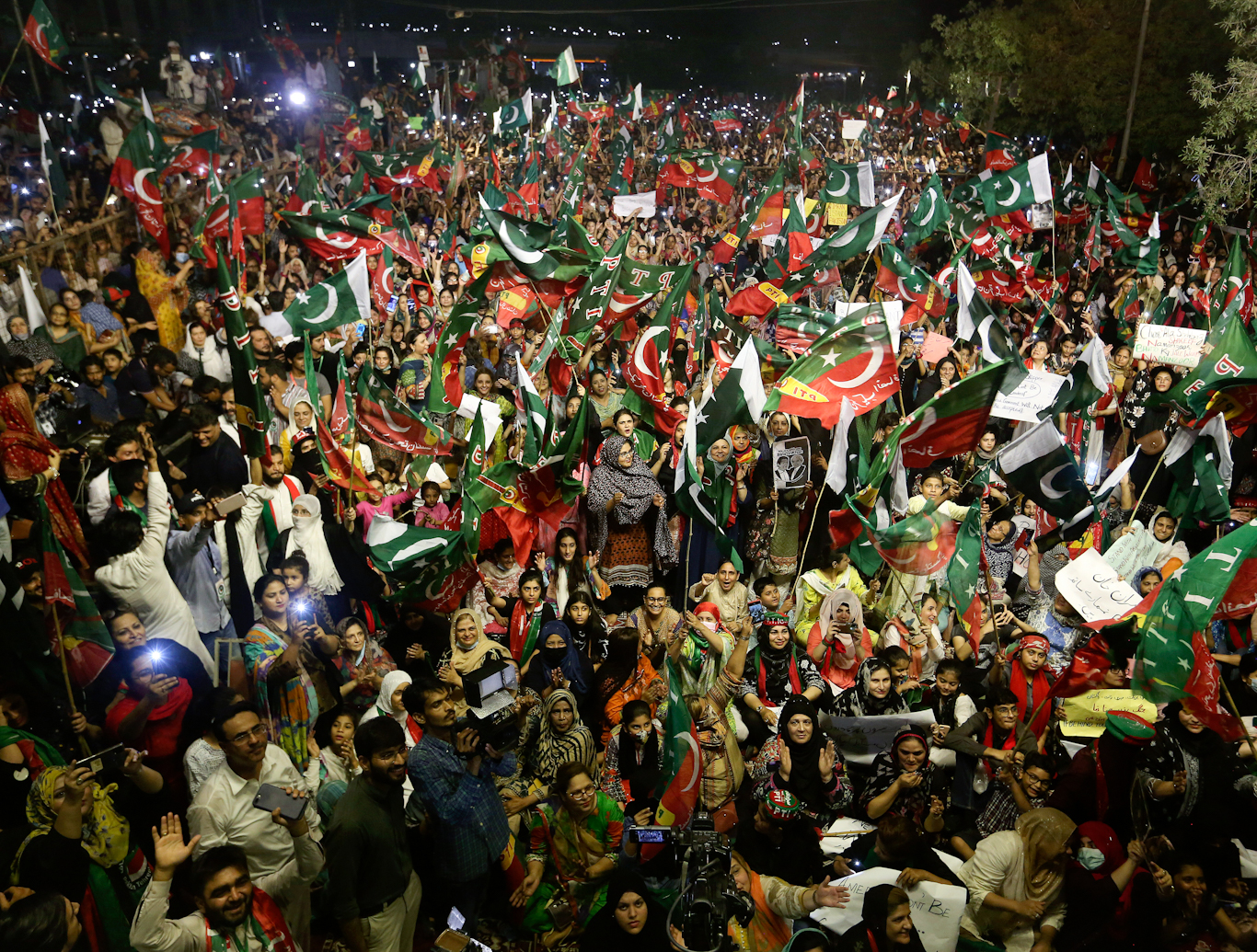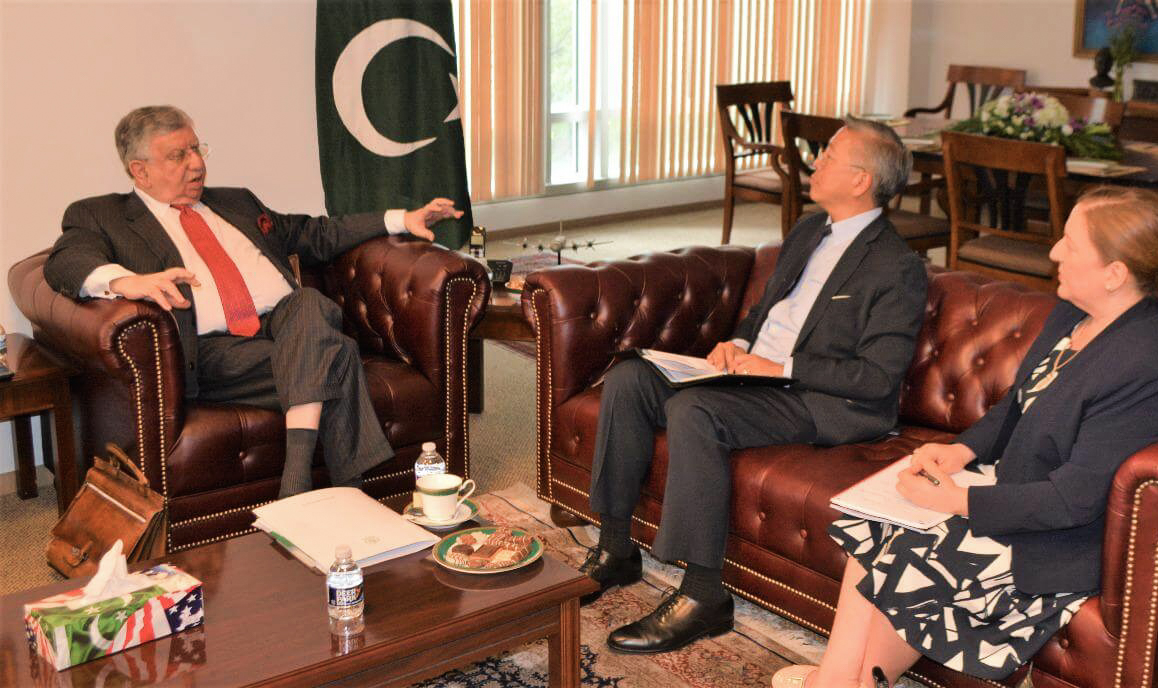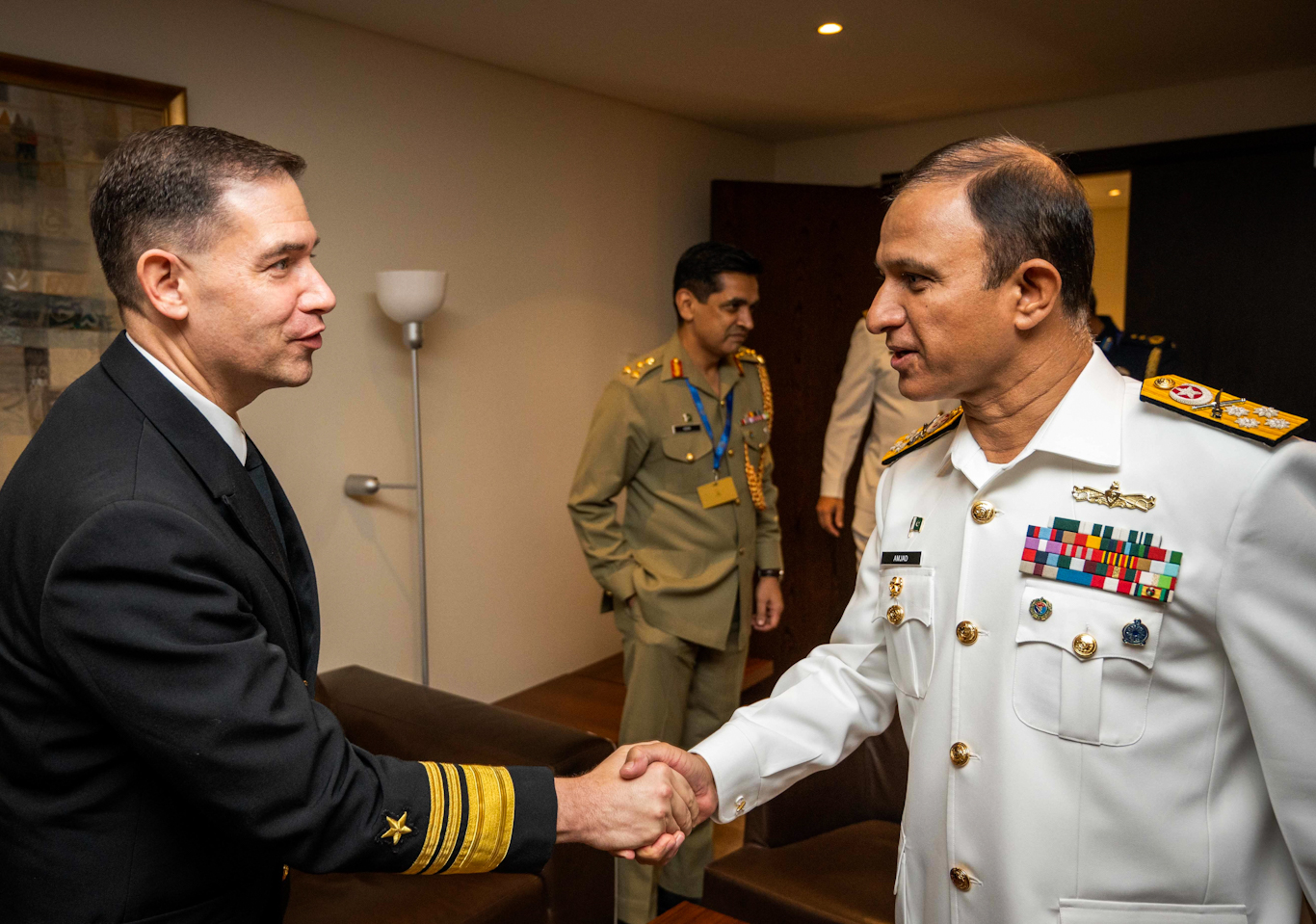
By Alan Macleod
ISLAMABAD – Following weeks of high drama and controversy that have racked the nation, Imran Khan has been removed from office. The Pakistani prime minister suffered a vote of no confidence and a loss in the supreme court, ending his rule after less than four years. Coalition partners abandoned him, leaving his Pakistan Tehreek-e-Insaf (PTI) party in the minority.
The cricket-star-turned-political-leader had been warning for some weeks that a foreign power – assumed to be the United States – was seeking to overthrow him because of his independent foreign policy, which saw Pakistan grow closer to Russia and China. Then, in a long public address on April 8, he directly named Washington as a prime instigator in the regime-change conspiracy, accusing the U.S. of bribing his political allies with tens of millions of dollars to desert his coalition. He described the practice as “open horse trading” and the “selling of lawmakers like goats and sheep.”
Khan singled out Assistant Secretary of State for South and Central Asia Affairs Donald Lu as the mastermind of the operation. “It was an official meeting between Donald Lu and our ambassador, with notetakers,” he said, sharing a diplomatic cable from Pakistani Ambassador to the United States Asad Majeed, in which he claimed Lu had essentially threatened his country with a coup if it did not immediately change course. In contrast, if Khan were deposed, “all will be forgiven” and Pakistan could return to its status as a favored U.S. ally. Khan then invited several journalists, members of his cabinet, and security agents to view the document. However, the Islamabad High Court immediately blocked the public dissemination of the cable on the grounds that Khan would be breaking his secrecy oath.
The ousted prime minister has not quietly accepted his fate. On the contrary, he is organizing a series of street demonstrations that have drawn huge crowds. “I want all our people to come, as Pakistan was created as an independent, sovereign state, not as a puppet state of foreign powers,” he said of a rally in the northwestern city of Peshawar, his first appearance after, in his own words, “being removed through a foreign-instigated regime change.” Khan and his PTI Party are calling for an immediate electoral showdown, apparently confident in their ability to win. “Let the people decide, through fair and free elections, whom they want as their prime minister,” he demanded.

Supporters of Imran Khan rally to condemn his ouster in Karachi on April 10, 2022. Fareed Khan | AP
Many, both inside and outside Pakistan, appear convinced that the United States is behind his downfall. Investigative journalist Ben Norton told MintPress News:
This is an incredible, blatant act of meddling by the U.S. government. Of course, anyone who knows the basic history of the U.S. knows that it has organized coups and impeachments and color revolutions around the world for many decades, but this was pretty much done in broad daylight!”
The United States has categorically denied any involvement. “Let me just say very bluntly there is absolutely no truth to these allegations. Of course, we continue to follow these developments, and we respect and support Pakistan’s constitutional process and rule of law. But again, these allegations are absolutely not true,” State Department spokesperson Jalina Porter said at a press conference last week.
Others inside Pakistan reject the idea that this was a coup at all. Tooba Syed, an activist and a leader of the Awami Workers Party, said that this was the “first time in Pakistan that a prime minister has been constitutionally removed from his position… It has usually been done by military intervention. It is definitely a good step forward in terms of democracy in Pakistan.”
Beggars can’t be choosers
Despite the official denials, there is some evidence that the United States may have played a role in the proceedings. First Lu, the man at the center of the affair, has kept relatively silent. But when Indian newspaper The Hindustan Times directly asked him to confirm or deny the cable’s authenticity, giving him an opportunity to wash his hands of responsibility, Lu responded simply by saying, “We are following developments in Pakistan and we respect and support Pakistan’s constitutional process and the rule of law” – an answer that is far from a denial and could be interpreted as giving his blessing to proceedings.
Perhaps even more damning were remarks made by new Prime Minister Shahbaz Sharif. Responding to allegations that opposition parties, including his Pakistan Muslim League (N), were acting on behalf of Washington in exchange for better diplomatic and economic ties, Sharif appeared to agree. “Beggars can’t be choosers, please understand,” he said. “We have to feed our nation […] we have to send our children to school; we can’t fight with someone, can’t raise slogans against others,” he added.

US State Dept official Donald Lu, second from right, meets with Pakistan’s Finance Minister Shaukat Tarin, left, on October 15, 2021
For its part, the U.S. government immediately endorsed Sharif. Secretary of State Antony Blinken congratulated the new prime minister on his election, thereby firmly placing Washington on one side of this political battle.
Also of note has been the reaction of anti-Khan diplomats within Pakistan’s foreign services. Speaking on condition of anonymity to Dawn, an English-language newspaper founded by the Pakistan Muslim League, a host of diplomats harshly criticized Khan for having “skewered the principle of secure and confidential communications.” “The consequences of this ‘cablegate’ will go well beyond what is being discussed now, as it could hurt sensitive relationships and make open exchanges more difficult,” said one diplomat. Another foreign-service official lamented that, in the past, “we did not pull foreign policy controversies into domestic politics.” However, it seemed, those days were gone.
Yet none of them challenged the veracity of Khan’s cable. Therefore, the objection from oppositional figures inside the government appears to be that Khan was breaking protocol and publicizing secret information, rather than the information being false.
Why would the US want Khan gone?
Pakistan has, historically, had a close relationship with the United States, especially militarily. Between 2002 and 2018, the U.S. gave $33 billion worth of assistance to Pakistan, of which more than $14 billion was military aid. Its armed forces are stocked with the best American gear and its officers are trained in the United States.
Pakistan was also a key player in the U.S. occupation of neighboring Afghanistan, with successive administrations allowing the U.S. military to conduct operations from its territory. The result was a humanitarian disaster for the country; an estimated 83,000 Pakistanis lost their lives as a consequence of the War on Terror.
Khan, who had long opposed U.S. actions in the region, sharply reduced the nation’s involvement in the war. “There is no way we are going to allow any bases, any sort of action from Pakistani territory into Afghanistan. Absolutely not,” he told an interviewer from Axios last year. He also began to increase military purchases from and cooperation with China, a decision that angered many of his army’s top brass.
Khan’s administration was not the first to move toward Beijing, but he certainly continued to build ties with China. Chief among these connections is the new China-Pakistan Economic Corridor, a $62 billion infrastructure network that links the two countries and helps boost trade worldwide. Often described as a Chinese Marshall Plan, projects under construction include a 700-mile motorway between Karachi and Lahore as well as a vast network of roads and high-speed rail links that criss-cross the country and connect major Pakistani cities with the trading hub of Kashgar in the far west of China.
Pakistan plays a leading role in China’s Belt-and-Road Initiative, thanks to the Gwadar Port on the Arabian Sea. The new port is already a major trading hub and is in the process of being vastly expanded. This process is set to make it one of the most important locations for world trade. Pakistan will soon be connected to western China via rail, creating a new Silk Road and a land route from East to West Asia, cutting delivery times and allowing Chinese ships to avoid the Straits of Malacca and the increasingly contested South China Sea.
A symbol of the improved relations between the two nations emerged earlier this year when Khan defied Western orders to boycott the Beijing Winter Olympics and attended the opening ceremony. Khan has lauded China’s anti-poverty initiatives and been described as the country’s new “best friend” on the international stage.
The ousted prime minister also provoked Washington’s ire by pursuing cordial relations with Russia. Pakistan refused to condemn Russia’s invasion of Ukraine, let alone help the U.S. impose sanctions on Moscow. Indeed, by chance, Khan was in Moscow on February 24, negotiating an expansive economic deal whereby Pakistan agreed to purchase Russian gas and import 2 million tons of grain. The U.S. government directly communicated its displeasure with Khan over his decision to be the first Pakistani leader in over two decades to visit Moscow.
On a regional level, the Khan administration has also taken steps that have angered the world’s sole superpower. Khan has attempted to increase close bilateral collaboration to improve trade and transport links with Iran, describing their 517-mile border as a frontier of “peace and friendship” and expressing his happiness at the “positive momentum in brotherly relations between the two countries.” In 2019, he also tried to broker peace negotiations between Iran and Saudi Arabia, an agreement that could have brought considerably more peace to the Middle East. The Trump administration vehemently opposed these negotiations, scuppering them weeks later by assassinating Iranian General Qassem Soleimani.
Khan condemned the U.S. sanctions on Iran and called for their removal. “It is very unjust they are dealing with such a large [COVID] outbreak on one side, and on the other, they are facing international sanctions,” he said in 2020.
While he has supported Iran, he has also publically opposed many of the policies of key U.S. allies Saudi Arabia and Israel. Khan successfully campaigned against Pakistani involvement in the Saudi-led war on Yemen, while he has consistently championed Palestinian rights and demanded the Muslim world do more to help them. “A day will come when Palestinians will get their own country, a just settlement, and they will be able to live as equal citizens,” he said last year, comparing their struggle to that of the worldwide campaign against Apartheid South Africa. Meanwhile, he has also publicly supported imprisoned publisher Julian Assange.
Far from a radical
These sorts of policy moves would, if he were a Western politician, mark Khan out as a radical anti-imperialist and likely politically far-left. Yet the PTI party has governed on a much more moderate agenda, centered around vague messages of anti-corruption and reform.
In 2018, Khan inherited an economy that was in shambles and quickly dropped many of his more ambitious economic and social goals. Indeed, the PTI soon entered into negotiations with the International Monetary Fund (IMF) for a multi-billion dollar bailout. As usual, the Fund demanded a wide range of aggressive austerity measures that meant deep cuts to social security and public services. As inflation grew, wage increases were halted and subsidies on utilities were reduced.
On top of all this, the COVID-19 pandemic hit Pakistan hard. A nationwide lockdown killed any chance of an economic recovery and caused widespread distress, particularly among the working classes. Incomes fell by 42% and unemployment rose by 34%, with the temporary shutdown permanently shuttering many businesses.
Many commentators have been left unimpressed with the former national cricket captain’s record as prime minister. Lahore-born historian and writer Tariq Ali is one of them. Commenting on Khan’s ouster, Ali asked:
Has the PTI government achieved anything? I would say no. It has faced tough economic problems. It’s gone to the IMF. All that is true. But it had no vision at all, just like the other political parties in the country. So it became like them. And all the promises of modernizing Pakistan, changing it forever, amounted to nothing.”
The power of the military
Also unimpressed with Khan and his politics has been the powerful Pakistani military. While he was perceived as being close to the Army in 2018, in recent weeks, it has become clear that the military has turned on Khan. During a rare press conference, Army spokesman Major General Babar Iftikhar categorically rejected Khan’s claims of a foreign-backed coup. “The words used are in front of you … as I said … the words used are clear. Is there any word such as conspiracy used in it? I think not,” he said. Iftikhar also criticized Khan’s trip to Russia as “very embarrassing.”
Thus, while the Pakistani public might have accepted the country’s shift towards China and Russia, the military certainly has not. Many of the top generals have close ties to the United States, having been trained and regularly traveling there for instruction. The thoroughly Westernized military establishment is far less keen to collaborate with their Chinese counterparts, and would much rather spend months in the U.S. than in China, where they do not speak the language or understand the culture. Furthermore, as Pakistani journalist Waqas Ahmed noted, the Pakistani military is almost totally equipped with U.S. weaponry and does not appreciate their new Chinese technology, which they perceive as inferior.
Consequently, it appears clear that the military played a decisive role in Khan’s ouster. As Ahmed said, “So if their [the anti-Khan opposition’s] claim was that all these parties joined the PTI on the wishes of the military, on whose wishes did they leave?”

Brad Cooper, head of US Naval Central Command, meets with Amjad Niazi, the head of Pakistan’s Navy in Riyadh, Saudi Arabia, on March 6, 2022. Photo | DVIDS
Few in Pakistan contest that the Army holds ultimate power. For much of its post-independence history, the country has been directly ruled as a military dictatorship. There have been multiple successful military coups, including in 1953-1954, 1958, 1977, and 1999. Indeed, none of Pakistan’s 29 prime ministers has ever finished a full term in office.
Some of these coups were carried out in coordination with Washington. A declassified CIA document from 1975 discussed the possibility of removing Prime Minister Zulfikar Ali Bhutto. Similar to Khan, Bhutto publicly alleged that the CIA was behind his 1977 ouster, and acted because of his strong support of the country’s non-aligned position, his rejection of the Vietnam War, his pursuit of nuclear weapons, and his cordial relationship with China. Bhutto was executed two years later.
In more recent times, the military and intelligence services have worked closely with the U.S. government, helping them in their controversial spy campaign to track down Osama Bin Laden, and allowing the country to be used as a base to attack Afghanistan.
A dangerous near miss
The Pakistani military is thought to possess around 165 nuclear warheads. The country’s nuclear status came into sharp relief just as the campaign to oust Khan was heating up. While the world was concentrating on Ukraine, a potentially far more deadly incident occurred when India mistakenly fired a BrahMos cruise missile – the sort it uses to deliver its nuclear warheads – into Pakistan. In the course of routine maintenance, the rocket was accidentally launched. India did not immediately inform its neighbor of its mistake.
Faced with what seemed to be a nuclear attack, the Khan administration had no more than a few minutes to decide how to respond. One position was to launch Pakistan’s entire nuclear arsenal back at India – an action that could have spelled the end of organized human life worldwide. In the end, they decided to simply let themselves be hit. Fortunately, their bet that this was a terrible mistake proved correct, and the missile fell in a rural area of Punjab, killing no one.
“If our air force had not picked it up well inside India, there could have been an accidental reaction to this accidental launch. Do people realize the implications and consequences of that? That is very serious,” said Pakistan’s Foreign Minister Shah Mahmood Qureshi, who, last week, was deposed along with Khan. “I am not trying to be dramatic about it but it is a realistic assessment… I am shocked that the media and the world have failed to feel this tremor,” he added.
Despite official U.S. denials, circumstantial evidence suggests that Washington might have had at least a guiding hand in the removal of Imran Khan from power. From its immediate endorsement of new Prime Minister Shahbaz Sharif, whose off-the-cuff comments more-or-less admitted its involvement, it appears that the U.S. at very least gave its tacit blessing to the move to topple Khan. He, therefore, joins the long list of deposed prime ministers and underscores the reality that, in Pakistan, whoever the people elect, the U.S.-backed military is always in charge.
Feature photo | Supporters of Imran Khan attend a rally to protest his ouster in Peshawar, Pakistan, April 13, 2022. Muhammad Sajjad | AP
Alan MacLeod is a Senior Staff Writer for MintPress News. After completing his PhD in 2017 he published two books: Bad News From Venezuela: Twenty Years of Fake News and Misreporting and Propaganda in the Information Age: Still Manufacturing Consent, as well as a number of academic articles. He has also contributed to FAIR.org, The Guardian, Salon, The Grayzone, Jacobin Magazine, and Common Dreams.
ATTENTION READERS
We See The World From All Sides and Want YOU To Be Fully InformedIn fact, intentional disinformation is a disgraceful scourge in media today. So to assuage any possible errant incorrect information posted herein, we strongly encourage you to seek corroboration from other non-VT sources before forming an educated opinion.
About VT - Policies & Disclosures - Comment Policy



